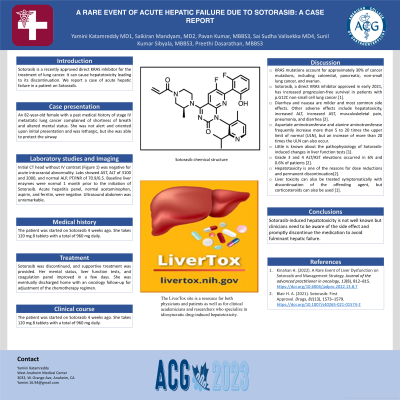Tuesday Poster Session
Category: Liver
P3949 - A Rare Event of Acute Hepatic Failure Due to Sotorasib: A Case Report
Tuesday, October 24, 2023
10:30 AM - 4:00 PM PT
Location: Exhibit Hall

Has Audio

Yamini Katamreddy, MD
West Anaheim Medical Center
Anaheim, California
Presenting Author(s)
Yamini Katamreddy, MD1, Saikiran Mandyam, MD2, Pavan Kumar, MBBS3, Sai Sudha Valisekka, MD4, Sunil Kumar Sibyala, MBBS3, Preethi Dasarathan, MBBS3
1West Anaheim Medical Center, Anaheim, CA; 2South East Health, Dothan, AL; 3Sri Venkateswara Medical College, Tirupati, Andhra Pradesh, India; 4University of Minnesota, Minneapolis, MN
Introduction: Sotorasib is a recently approved direct KRAS inhibitor for the treatment of lung cancer. It can cause hepatotoxicity leading to its discontinuation. We report a case of acute hepatic failure in a patient on Sotorasib.
Case Description/Methods: An 82-year-old female with a past medical history of stage IV metastatic lung cancer complained of shortness of breath and altered mental status. She was not alert and oriented upon initial presentation and was lethargic, but she was able to protect the airway. Initial CT head without IV contrast (Figure 1) was negative for acute intracranial abnormality. Labs showed AST, ALT of 3100 and 2000, and normal ALP, PT/INR of 70.9/6.5. Baseline liver enzymes were normal 1 month prior to the initiation of Sotorasib. Acute hepatitis panel, normal acetaminophen, aspirin, and ferritin, were negative. Ultrasound abdomen was unremarkable. The patient was recently started on Sotorasib 4 weeks ago. She takes 120 mg 8 tablets with a total of 960 mg daily. Sotorasib was discontinued, and supportive treatment was provided. Her mental status, liver function tests, and coagulation panel improved in a few days. She was eventually discharged home with an oncology follow-up for adjustment of the chemotherapy regimen.
Discussion: KRAS mutations account for approximately 30% of cancer mutations, including colorectal, pancreatic, non-small lung cancer, and ovarian. Sotorasib, a direct KRAS inhibitor approved in early 2021, has increased progression-free survival in patients with p.G12C non-small cell lung cancer [1]. Diarrhea and nausea are milder and most common side effects. Other adverse effcts include hepatotoxicity, increased ALT, increased AST, musculoskeletal pain, pneumonia, and diarrhea [2]. Aspartate aminotransferase and alanine aminotransferase frequently increase more than 5 to 20 times the upper limit of normal (ULN), but an increase of more than 20 times the ULN can also occur. Little is known about the pathophysiology of Sotorasib-induced changes in liver function tests [1]. Grade 3 and 4 ALT/AST elevations occurred in 6% and 0.6% of patients [2]. Hepatotoxicity is one of the reasons for dose reductions and permanent discontinuation [2]. Liver toxicity can also be treated with symptomatically with discontinuation of the offending agent, but corticosteroids can also be used [1]. Sotorasib-induced hepatotoxicity is not well known but clinicians need to be aware of the side effect and promptly discontinue the medication to avoid fulminant hepatic failure.
Disclosures:
Yamini Katamreddy, MD1, Saikiran Mandyam, MD2, Pavan Kumar, MBBS3, Sai Sudha Valisekka, MD4, Sunil Kumar Sibyala, MBBS3, Preethi Dasarathan, MBBS3. P3949 - A Rare Event of Acute Hepatic Failure Due to Sotorasib: A Case Report, ACG 2023 Annual Scientific Meeting Abstracts. Vancouver, BC, Canada: American College of Gastroenterology.
1West Anaheim Medical Center, Anaheim, CA; 2South East Health, Dothan, AL; 3Sri Venkateswara Medical College, Tirupati, Andhra Pradesh, India; 4University of Minnesota, Minneapolis, MN
Introduction: Sotorasib is a recently approved direct KRAS inhibitor for the treatment of lung cancer. It can cause hepatotoxicity leading to its discontinuation. We report a case of acute hepatic failure in a patient on Sotorasib.
Case Description/Methods: An 82-year-old female with a past medical history of stage IV metastatic lung cancer complained of shortness of breath and altered mental status. She was not alert and oriented upon initial presentation and was lethargic, but she was able to protect the airway. Initial CT head without IV contrast (Figure 1) was negative for acute intracranial abnormality. Labs showed AST, ALT of 3100 and 2000, and normal ALP, PT/INR of 70.9/6.5. Baseline liver enzymes were normal 1 month prior to the initiation of Sotorasib. Acute hepatitis panel, normal acetaminophen, aspirin, and ferritin, were negative. Ultrasound abdomen was unremarkable. The patient was recently started on Sotorasib 4 weeks ago. She takes 120 mg 8 tablets with a total of 960 mg daily. Sotorasib was discontinued, and supportive treatment was provided. Her mental status, liver function tests, and coagulation panel improved in a few days. She was eventually discharged home with an oncology follow-up for adjustment of the chemotherapy regimen.
Discussion: KRAS mutations account for approximately 30% of cancer mutations, including colorectal, pancreatic, non-small lung cancer, and ovarian. Sotorasib, a direct KRAS inhibitor approved in early 2021, has increased progression-free survival in patients with p.G12C non-small cell lung cancer [1]. Diarrhea and nausea are milder and most common side effects. Other adverse effcts include hepatotoxicity, increased ALT, increased AST, musculoskeletal pain, pneumonia, and diarrhea [2]. Aspartate aminotransferase and alanine aminotransferase frequently increase more than 5 to 20 times the upper limit of normal (ULN), but an increase of more than 20 times the ULN can also occur. Little is known about the pathophysiology of Sotorasib-induced changes in liver function tests [1]. Grade 3 and 4 ALT/AST elevations occurred in 6% and 0.6% of patients [2]. Hepatotoxicity is one of the reasons for dose reductions and permanent discontinuation [2]. Liver toxicity can also be treated with symptomatically with discontinuation of the offending agent, but corticosteroids can also be used [1]. Sotorasib-induced hepatotoxicity is not well known but clinicians need to be aware of the side effect and promptly discontinue the medication to avoid fulminant hepatic failure.
Disclosures:
Yamini Katamreddy indicated no relevant financial relationships.
Saikiran Mandyam indicated no relevant financial relationships.
Pavan Kumar indicated no relevant financial relationships.
Sai Sudha Valisekka indicated no relevant financial relationships.
Sunil Kumar Sibyala indicated no relevant financial relationships.
Preethi Dasarathan indicated no relevant financial relationships.
Yamini Katamreddy, MD1, Saikiran Mandyam, MD2, Pavan Kumar, MBBS3, Sai Sudha Valisekka, MD4, Sunil Kumar Sibyala, MBBS3, Preethi Dasarathan, MBBS3. P3949 - A Rare Event of Acute Hepatic Failure Due to Sotorasib: A Case Report, ACG 2023 Annual Scientific Meeting Abstracts. Vancouver, BC, Canada: American College of Gastroenterology.
